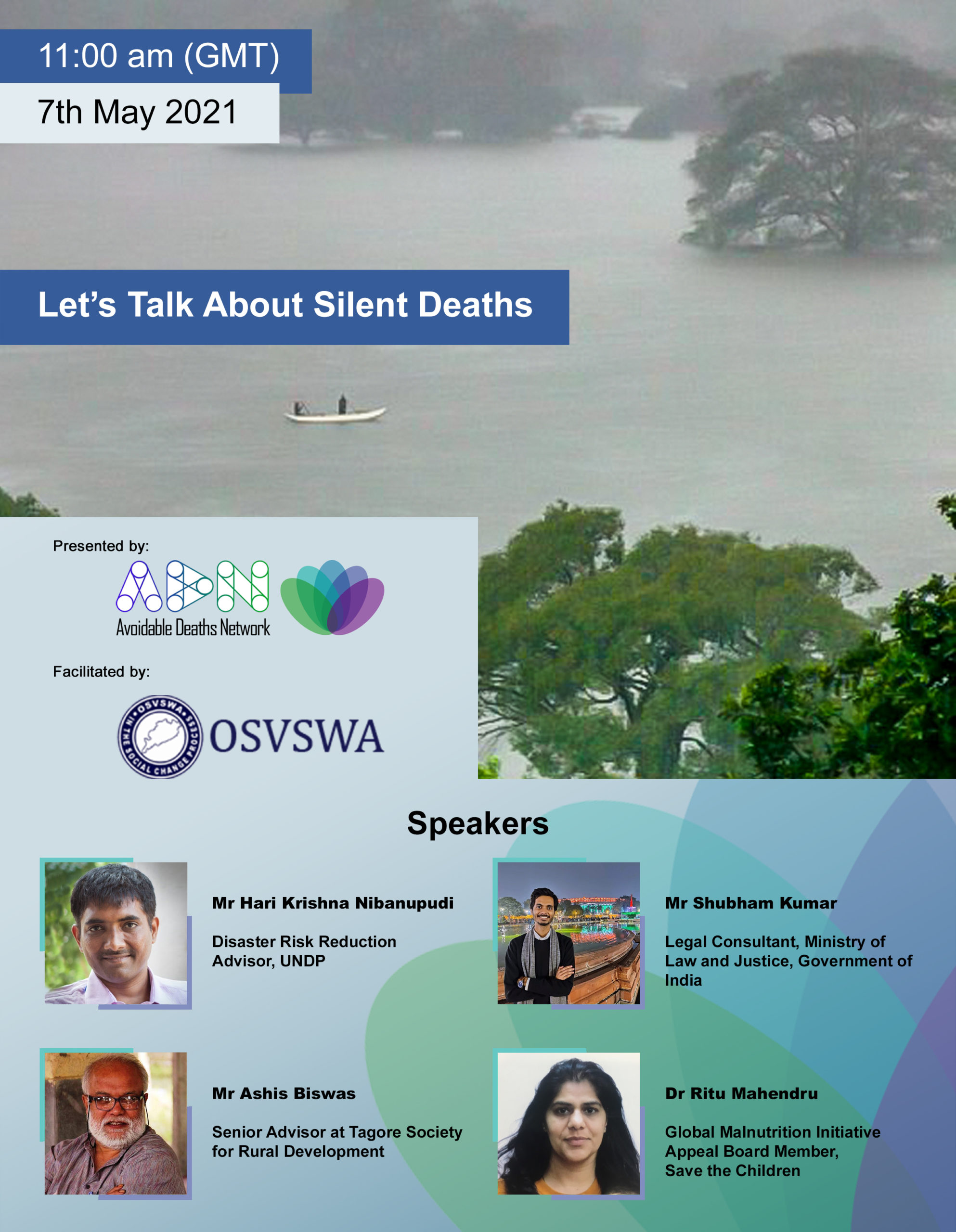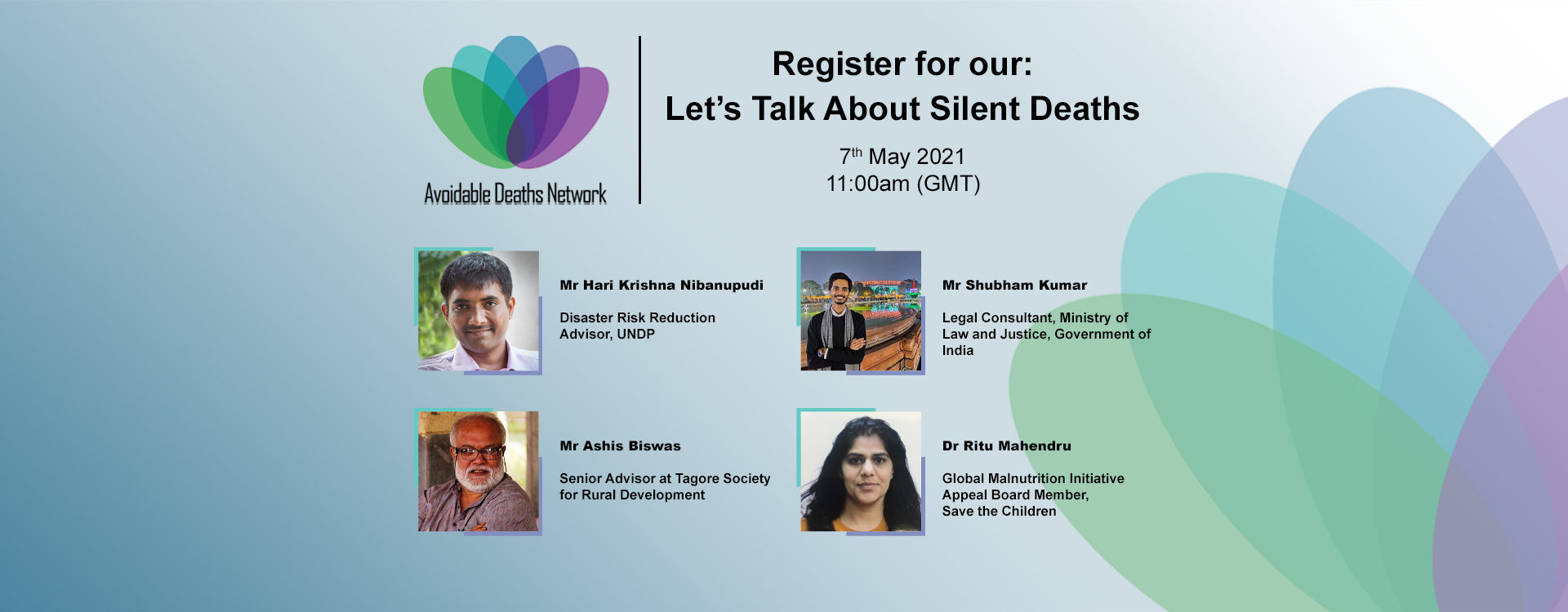ADN’s Special Session – Let’s Talk About Silent Deaths
This page contains the Description, Timetable and Speakers’ Biographies for the Special Session on Let’s Talk About Silent Deaths. To download the flyer for the event, please click here.
Description
The Special Session, titled: Let’s Talk About Silent Deaths aims to raise the visibility of silent deaths in the context of disasters and sustainable development. It will will be held virtually on 7 May 2021 at 11.00 AM – 1.11 PM GMT+1. It is organised by the Avoidable Deaths Network (ADN) in collaboration with Orissa State Voluntary Social Workers Association (OSVSWA) in India. Mr Dillip Pattanaik from OSVSWA will be chairing the Special Session.
This Special Session is an open event. ADN’s Special Sessions are suitable for disaster responders, students, academics, researchers, policymakers, opinion formers, and practitioners interested in avoidable deaths, UN’s Sendai Framework for Disaster Risk Reduction’s Goal A and B, and the Sustainable Development Goals.
Timetable
|
Time |
Session Title |
Speaker |
| 10:45 – 11:00 |
Conference digital platform login on Zoom & Gathering of panellists/speakers |
|
| 11:00 – 11:05 |
Welcome speech / Housekeeping / Explanation of Structure / Introduction of the Speakers by Chair |
Mr Dillip Pattanaik |
| 11:05 – 11:15 |
Introduction to the ADN & Poll |
Dr Nibedita S. Ray-Bennett and Dr Hideyuki Shiroshita |
| 11:15 – 11:35 |
Reducing the avoidable deaths of children in low-and middle-income countries |
Dr Ritu Mahendru |
| 11:35 – 11:55 |
Manual Scavenging in India: Intersection of gender and caste-based inequalities |
Mr Shubham Kumar |
| 11:55 – 12:35 |
Million Bites and Avoidable Deaths in our Streets |
Mr Hari Krishna |
| 12:35 – 12:55 |
Sudden Death in the Sundarbans |
Mr Ashis Biswas |
| 12:55 – 13:05 |
Panel Discussionants |
Mr Mihir Bhatt and Dr Ambika Prasad Nanda |
| 13.05 – 13.08 |
Poll |
Dr Hideyuki Shiroshita |
| 13:08 – 13:11 |
Closing of Ceremony by the Chair |
Mr Dillip Pattanaik |
Speakers’ Biographies
Dr Ritu Mahendru has a background in leading, developing and implementing health policies, programmes and evaluations for INGOs, UN agencies, and governments in the development and humanitarian contexts in Africa, South Asia, the Middle East, and Eastern Europe. More recently, Ritu joined Save the Children as a Global Malnutrition Initiative Appeal Board Member.
Dr Shubham Kumar is currently working as a Legal Consultant to the Ministry of Law and Justice, Government of India. Before that, he did a one-year long LAMP Fellowship (Legislative Assistant to Member of Parliament). Shubham is a law graduate from National Law University, Lucknow. He has also worked with Justice D.Y. Chandrachud (Supreme Court of India) and Justice Rajan Roy (Allahabad High Court). Shubham has several publications to his credit in the academic journals, Economic & Political Weekly, and has extensively written in popular online portals, including Live Law, Outlook and Gaon Connection. His academic interests include law and governance, public policy, constitutional law and theory, social justice, intersectionality, human rights, among others.
Mr Hari Krishna Nibanupudi is an International development professional with over two decades of Policy and Practice Experience in the fields of International Humanitarian Assistance, Disaster Risk Reduction, Sustainable Development, Climate Change Adaptation and Regional Cooperation.
He has served reputed International organizations such as Oxfam, World Bank Institute (WBI), International Center for Integrated Mountain Development (ICIMOD), United Nations Development Program (UNDP), etc., in South Asia, South East Asia, The Middle East and Africa. Hari Krishna has also published a number of award-winning blog articles, opinion pieces, research papers and videos. He is currently serving UNDP in the Middle East as Disaster Risk Reduction Advisor.
Mr Ashis Biswas is currently Senior Advisor at Tagore Society for Rural Development. Ashis Biswas led several NGOs, including CARE and the Tagore Society for Rural Development, whose work in the Indian Sundarbans inspired many others. Overseas experience in Oman, Sudan, Uzbekistan and Ethiopian Somali. He initiated Behaviour Change Communication for Maternal and Neo Natal Health among eastern Indian tribals and was the Founder President of the West Bengal Right To Information Manch. He has strong documentation skills and was a regular contributor to Farmers’ Forum, a prestigious periodical devoted to rural livelihoods in its time

